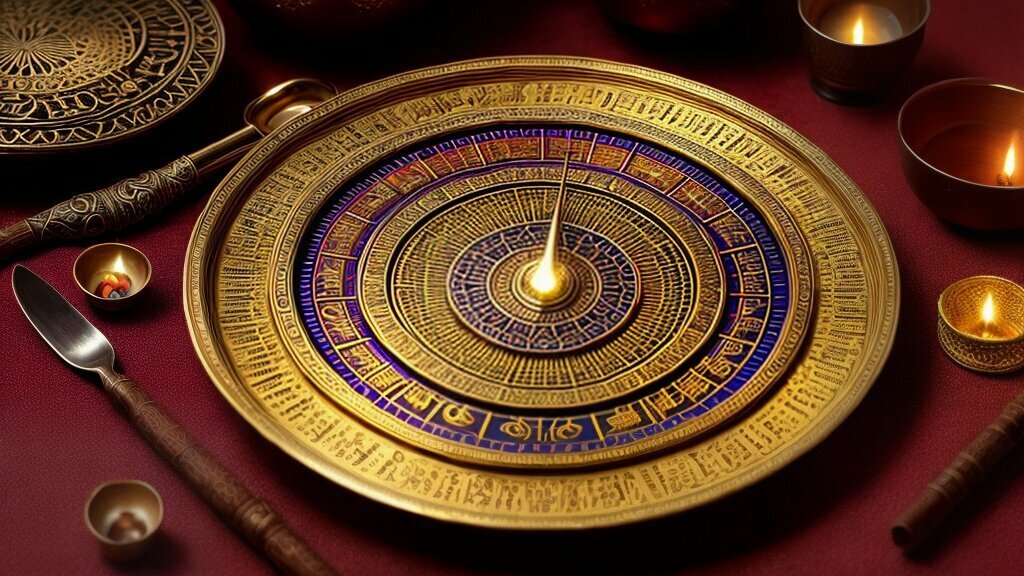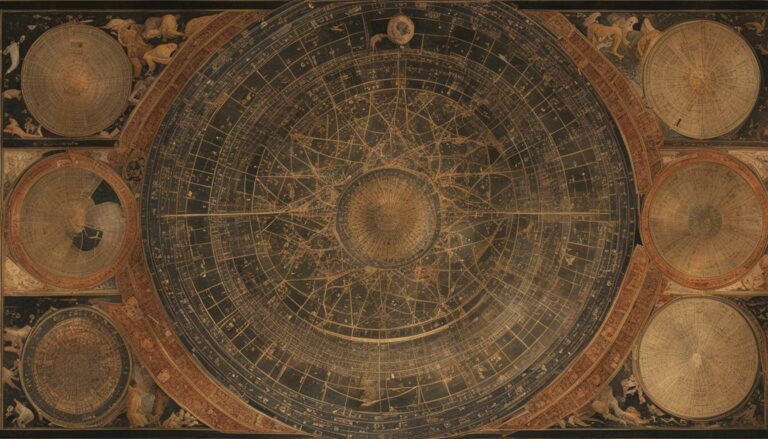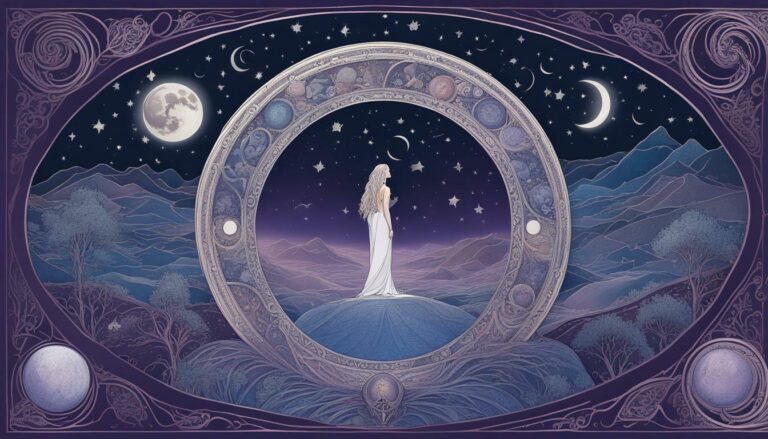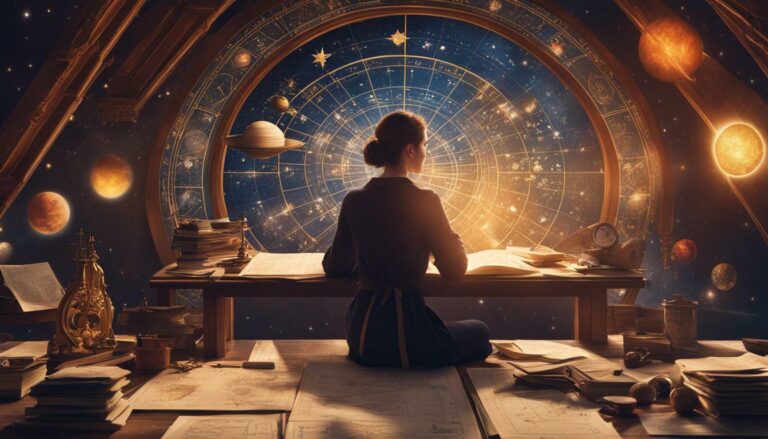Who Invented Astrology in India? Unveiling the Ancient Origins
Welcome to the fascinating world of Indian astrology. This ancient practice has been part of Indian culture for centuries, with a rich history and deep roots in spirituality and philosophy. But have you ever wondered who invented astrology in India?
The origins of Indian astrology are shrouded in mystery, with no clear answer to who invented it. However, scholars and historians have been on a quest to uncover its ancient origins and the pioneers behind its development.
Key Takeaways:
- The origins of Indian astrology are uncertain, but scholars are working to uncover its ancient roots.
- Ancient Indian astrology has a rich history and deep roots in spirituality and philosophy.
- Despite uncertainty around its origins, Indian astrology has had a significant impact on Indian society and culture.
Ancient Indian Astrology: A Historical Overview
Astrology has a long and fascinating history in India, with roots that stretch back thousands of years. Ancient Indian astronomers made significant contributions to the development of astrological traditions that continue to shape the practice of astrology in India today.
One of the earliest and most influential works on Indian astrology is the Brihat Parashara Hora Shastra, written by the sage Parashara around 2000 BCE. This foundational text outlines the principles of astrology and describes various astrological techniques and methods that are still used in India today.
Over the centuries, many other astrological texts were written in India, each building on the knowledge and techniques of the past. These works include the Jaimini Sutras, the Varahamihira’s Brihat Samhita, and the Saravali of Kalyana Varma.
Ancient Indian Astrology and Astronomy
In ancient India, astrology and astronomy were closely linked, and many of the country’s most influential astronomers were also astrologers. One of the most famous of these early pioneers was Aryabhata, who lived around 476 CE. Aryabhata developed many important theories and methods in both astronomy and astrology, including the now-standard idea that the Earth rotates on its axis.
Other notable astronomers of ancient India include Brahmagupta, who made significant contributions to the study of planetary motion, and Bhaskara II, who is credited with the discovery of the principles of differential calculus.
Astrological Traditions in India
In addition to the contributions of individual astronomers and astrologers, India is also home to a rich and diverse variety of astrological traditions. These traditions vary widely depending on region, religion, and cultural background, but they all share a common foundation in the principles of Vedic astrology.
Some of the most prominent astrological traditions in India include Jyotish, which focuses on the study of the movement of celestial bodies and their influence on human affairs; Tantra, which involves the use of specific rituals and practices to achieve spiritual enlightenment; and Horary astrology, which uses astrological charts to answer specific questions or predict future events.
Overall, the history of ancient Indian astrology is long and complex, marked by the contributions of many great thinkers and scholars. Today, astrology remains an integral part of Indian culture and spirituality, offering insight into the mysteries of the universe and the nature of existence itself.
The Vedic Astrology Connection
As you explore the history of astrology in India, it becomes clear that Vedic astrology is an integral part of the country’s astrological traditions. The Vedas, a collection of ancient Hindu texts, include references to astrology and the importance of celestial bodies in shaping human destiny.
Vedic astrology, also known as Jyotish, is based on the Sidereal Zodiac, which takes into account the fixed position of stars in the sky, as opposed to the Tropical Zodiac used in Western astrology. It emphasizes the connection between karma (actions) and jiva (soul), providing insights into past, present, and future events.
Vedic astrology has been passed down through generations of gurus and has evolved over time, incorporating different techniques and systems. It is still widely practiced in India today and has gained popularity around the world, thanks to its accuracy in predicting life events and offering guidance on various aspects of life.
The Early Pioneers of Indian Astrology
Indian astrology has a long and rich history, and it owes much of its development to the early pioneers who laid the foundations of the practice. These individuals were revered for their knowledge and skill, and their contributions have proven invaluable to not only the development of astrology in India, but to the world as a whole.
The early pioneers of Indian astrology were a diverse group of individuals who hailed from various parts of India and brought their unique perspectives and techniques to the practice. Some of the most notable pioneers include:
| Pioneer | Contribution |
|---|---|
| Varahamihira | Astronomer and author of several influential works on astrology |
| Bhattotpala | Noted for his commentary on Varahamihira’s works and his contributions to the study of horoscopy |
| Parashara | Author of the Brihat Parashara Hora Shastra, a renowned text on astrology |
These early pioneers were instrumental in developing the various astrological systems and techniques that continue to influence the practice of astrology today. They helped to establish the principles of Indian astrology and create the framework for the vast body of knowledge that has accumulated over the centuries.
Without the contributions of these early pioneers, Indian astrology would not be the rich and multifaceted system that it is today. Their dedication to the study of the heavens and their commitment to understanding the mysteries of the universe paved the way for countless astrologers and spiritual seekers to follow in their footsteps.
Astrology in Ancient Indian Texts
Astrology has been an integral part of Indian culture and spirituality for centuries, with its origins dating back to ancient times. The presence of astrology in Indian texts such as the Vedas, Puranas, and Upanishads highlights its significance in Indian society. Astrology was not only used to predict future events but also as a tool for understanding the self and the universe.
According to ancient Indian texts, the practice of astrology was believed to have been taught by the gods themselves. The Vedas, considered to be the oldest Hindu text, contains references to astrology and its importance in daily life. The Puranas, a collection of Hindu texts, also discusses astrology, providing insight into its use in religious rituals and cultural traditions.
“Astrology is the science of the effects of the planets on human beings.” – Brihat Parashara Hora Shastra
Astrology is also referenced in the Upanishads, a collection of philosophical texts that explore the nature of reality and the self. The Upanishads discuss astrology in the context of karma and reincarnation, suggesting that astrology can offer insight into an individual’s past and future lives.
Overall, the presence of astrology in ancient Indian texts highlights its significance in Indian culture and spirituality. Its use as a tool for understanding the self and the universe underscores the integral role it has played in shaping Indian society.
Astrological Techniques and Systems of India
Indian astrology is renowned for its diversity and complexity due to the numerous techniques and systems that have evolved over the centuries. These techniques and systems have their roots in ancient Indian traditions and are closely linked to Hindu philosophy and mythology.
1. Vedic Astrology
Also known as Jyotish, Vedic astrology is an ancient system that has its origins in the Vedas, the holy scriptures of Hinduism. It is a complex system that employs a range of techniques to interpret the positions and movements of celestial bodies, including the sun, moon, and planets.
Vedic astrology is unique in that it uses the Sidereal Zodiac, which is based on the fixed stars, as opposed to the Tropical Zodiac, which is based on the seasons. This difference results in a variance of about 23 degrees between the two systems.
2. Nakshatras
Nakshatras are the 27 lunar mansions of Vedic astrology. Each Nakshatra is associated with a specific star or constellation and has its own unique qualities and symbolism. They are used to determine the timing of auspicious events and to gain insight into an individual’s personality and life path.
3. Dashas
Dashas are planetary periods that are used to predict the timing of events in an individual’s life. They are calculated based on the positions of the planets at the time of an individual’s birth and can provide insight into different aspects of their life such as career, relationships, and finances.
4. Horary Astrology
Horary astrology is a system of astrology that is used to answer specific questions based on the positions of the planets at the time the question is asked. It can provide quick and accurate answers to questions about love, career, and health, among other things.
5. Nadi Astrology
Nadi astrology is a unique system of astrology that is based on the belief that certain palm leaf manuscripts contain the destinies of individuals who seek them out. These manuscripts are said to have been written thousands of years ago by ancient sages and contain detailed information about an individual’s past, present, and future.
These are just a few examples of the diverse astrological techniques and systems that have developed in India. Whether you are a believer or a skeptic, there is no denying the rich history and cultural significance of astrology in India.
Astrology’s Influence on Indian Society
When it comes to the impact of astrology on Indian society, it’s hard to overstate its significance. For centuries, astrology has played a central role in the lives of many Indians, shaping their beliefs, traditions, and daily practices.
One of the key ways astrology has influenced Indian society is through its impact on marriage. In India, horoscopes are often consulted before couples tie the knot, with astrological compatibility playing a major role in the decision-making process. This has led to the development of a robust industry of astrologers who specialize in matching horoscopes and providing guidance for married life.
Astrology has also had a significant impact on Indian spirituality. Many Indian traditions, such as yoga and Ayurveda, incorporate astrological principles and ideas into their practices. Additionally, astrology is frequently used to guide religious festivals and ceremonies, such as the timing of auspicious events and the selection of appropriate offerings.
The influence of astrology can also be seen in the domain of politics. Indian politicians often consult astrologers when making important decisions, such as choosing election dates and forming alliances. Astrology is also frequently used to guide economic decisions, such as the timing of investments and the selection of auspicious business partners.
Overall, astrology has played a significant and multifaceted role in shaping Indian society and culture. Whether in the realm of marriage, spirituality, politics, or economics, the impact of astrology can be felt in many facets of daily life for millions of Indians.
Conclusion
Congratulations, you have taken a fascinating journey through the ancient origins and evolution of astrology in India. From the contributions of ancient astronomers to the development of Vedic astrology, you have gained insights into the diverse and intricate nature of Indian astrological traditions.
We explored the early pioneers of Indian astrology and their foundational role in shaping the practice of astrology in India. We also discussed the presence of astrology in ancient Indian texts, highlighting its connection to Indian culture and spirituality.
Moreover, we explored the various astrological techniques and systems that developed in India, showcasing the vast and diverse landscape of Indian astrology. We discussed the significant influence of astrology on Indian society, showing how it has shaped various aspects of Indian culture, traditions, and beliefs.
In conclusion, you have uncovered the fascinating history of Indian astrology and the significant role it has played in shaping Indian culture and spirituality. We hope this journey has been enriching and has provided you with a deeper appreciation for this ancient practice.
FAQ
Q: Who invented astrology in India? Unveiling the Ancient Origins.
A: The origins of astrology in India are shrouded in mystery, with no specific individual credited as its inventor. However, astrology has been deeply ingrained in Indian culture for thousands of years, and its development can be traced back to ancient times.
Q: What is the historical overview of ancient Indian astrology?
A: Ancient Indian astrology has a rich history that dates back centuries. It has been shaped by the contributions of various astronomers and the development of distinct astrological traditions in India.
Q: How does Vedic astrology connect to Indian astrology?
A: Vedic astrology holds significant influence in Indian astrology. It originated from the ancient scriptures called the Vedas and plays a vital role in the astrological practices of India.
Q: Who were the early pioneers of Indian astrology?
A: Indian astrology owes its foundation to the early pioneers who made significant contributions to the field. These pioneers laid the groundwork for the practice of astrology in India.
Q: How does astrology feature in ancient Indian texts?
A: Astrology has a prominent presence in ancient Indian texts like the Vedas and Puranas. These texts provide insights into the role of astrology in Indian culture and spirituality.
Q: What are the different astrological techniques and systems in India?
A: India has developed a wide range of astrological techniques and systems that showcase the intricate and diverse nature of Indian astrology.
Q: How has astrology influenced Indian society?
A: Astrology has had a significant impact on Indian society, shaping various aspects of culture, traditions, and beliefs.
Q: What is the conclusion regarding the origin of astrology in India?
A: While the specific inventor of astrology in India remains unknown, its ancient origins and profound significance are unquestionable. Its development and influence can be traced back through centuries of Indian history.




